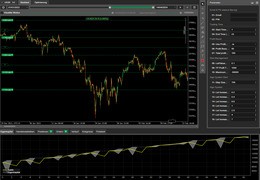Between reality and illusion If you want to know what trading really means—beyond luxury cars, piles of cash, and...
Search in blog
Blog categories
- FAQ – Your guide through the world of finance and technical facilities (2) click
- Daytrading Almanac (27) click
- Press release (23)
- Educational (26) click
- Projects (9)
- Chart analysis (39) click
- Trading bots for cTrader (11)
- AI in trading (5)
- Trading Strategien (11)
- Trading signals and stock market letters (46)
Latest posts

When it comes to traders, social media platforms often create a rather one-sided image: a young face smiling at the...

The TegasFX Instant Funding program sets a new standard for traders seeking quick access to capital without having to...

Backtesting trading strategies is an essential tool for traders who want to validate their methods across historical...

introduction In the world of trading, it can be challenging to balance the intense market activity and the rapid...
Popular posts





Featured posts





Photo gallery
No featured images
Archived posts
Top authors
-
 Christian Lill 70 Posts View posts
Christian Lill 70 Posts View posts -

-

-

-

Successfully start trading: requirements and tips
1. Education and research
Before you invest a single cent, it is essential that you learn the basics of trading. This includes:
-
Understanding the Financial Markets: Learn how the markets work, including the different asset classes (stocks, forex, commodities, etc.).
-
Technical Analysis: Study chart patterns, indicators and analysis methods to identify market trends and make trading decisions.
-
Fundamental analysis: Understand the underlying factors that affect financial markets, such as economic news, company reports and geopolitical events.
-
Trading Psychology: Recognize the impact of emotions on your trading decisions and learn how to control them.
2. Risk management
One of the most important aspects of trading is risk management. Without a solid risk management strategy, it is difficult to be successful in the long term.
-
Capital allocation: Only invest money that you can afford to lose without jeopardizing your financial security.
-
Stop-loss orders: Learn how and where to place stop-loss orders to limit potential losses.
-
Diversification: Avoid putting all your capital into one investment or trade.
3. A solid trading plan
A well-thought-out trading plan serves as your compass in the trading universe. It should include:
-
Trading goals: Clearly define what you want to achieve with your trading.
-
Trading Strategies: Develop strategies based on your analysis and risk tolerance.
-
Entry and exit rules: Determine when you will enter and when you will exit a trade.
4. The right tools and resources
Choosing the right trading platform and tools can significantly impact your trading experience.
-
Trading platform: Choose a platform that is user-friendly and offers the necessary analytical tools.
-
Broker: Find a reliable broker that offers low fees and is regulated.
-
News and data: Subscribe to services that provide current business news and data streaming.
5. Practice and patience
Trading is a skill that is improved with practice. Start with a demo account to sharpen your skills and gain confidence in your trading decisions without risking real money.
-
Demo Account: Use a demo account to practice without risking real money.
-
Patience: Resist the temptation to chase big wins; instead, focus on consistent, small wins.
6. Ongoing education and adaptation
The financial markets are dynamic and constantly changing, so it is important that your trading approach is also dynamic.
-
Continuing Education: Stay up to date with market changes and new trading techniques to ensure you always have the latest knowledge.
-
Adaptability: Be prepared to adapt your trading strategies quickly and effectively based on new information.
Summary
Successful trading requires more than just the will to succeed; it takes preparation, education, strategic planning, and the ability to manage emotions. By preparing thoroughly and following the steps above, you can increase your chances of becoming a successful trader.
Practical application: Before you start:
-
Take the time for thorough education and research.
-
Practice on a demo account before investing real money.
-
Develop a trading plan and test your strategies.
Daily:
-
Check economic news and market data.
-
Apply your trading strategies consistently.
-
Manage your risk carefully and adjust your positions accordingly.
Checklist for starting trading:
-
Is your trading education comprehensive enough?
-
Do you have a solid trading plan?
-
Is your risk management in place?
-
Do you have the right tools and access to data?
-
Are you ready to adapt your strategy if necessary?
Self-assessment questionnaire:
-
Are you familiar with the basics of technical and fundamental analysis?
-
How will you manage your risk on each trade?
-
What are your specific trading goals?
-
Do you have access to reliable business news and market data?
-
Are you willing to be patient and wait for the right trading opportunities?
By following these steps and continually checking yourself, you will lay the foundation for a successful trading career.
Leave a comment
Related posts
 Day Trading Almanac Foreword
Day Trading Almanac Foreword
 History of day trading
History of day trading
 Choosing the right trading platform
Choosing the right trading platform
 Case study: Automated trading (bot trading) and its impact on retail investors’ leisure activities
Case study: Automated trading (bot trading) and its impact on retail investors’ leisure activities
